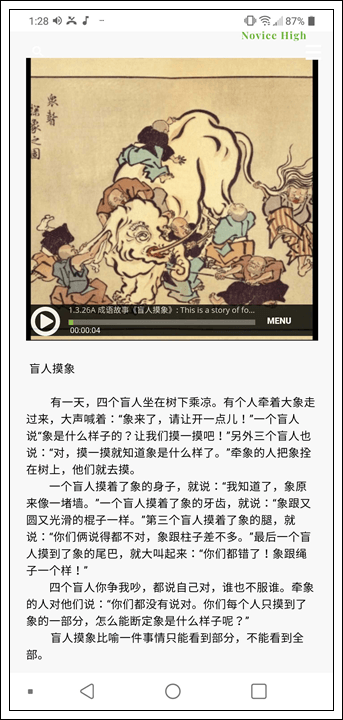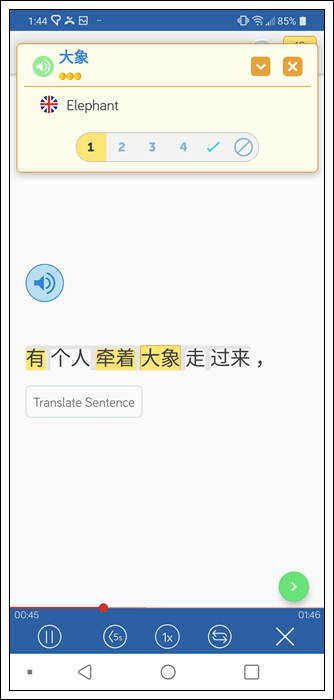Chinese Short Stories and Resources to Help You Study
When it comes to learning written Chinese characters, context is everything! Other than the fact that some words such as 面 (miàn) have multiple dictionary definitions, because Chinese is a language that goes through constant changes.
For instance, in Chinese, the word, 宅(zhái), by itself means “home” or “house.” However, when used in casual conversation, it can mean, “nerdy”.
In order to have a basic understanding of Chinese characters, it is important that you get to “see” the characters in action. And what better way to do so than to read/”breeze” through a Chinese short story or two?
So without further ado, 大家 让我们把本子拿出来 (dàjià,ràng wǒmen bǎ běnzi ná chūlái). In other words, “everyone let’s take out our notebooks” and dive deeper into the world of Chinese short stories (and where to find them)!
Where to Find Chinese Short Stories
Chinese Reading Practice
Created by American tech writer, Kendra Schaefer, Chinese Reading Practice is a great resource for anyone who wants to put their Chinese reading skills to practice via reading Chinese children’s stories.
Although the site is a little outdated, it is nevertheless a great place to start for those who already have the basics of pinyin covered.
Pros:
Each story comes with its own set of commentary. This way, beginner learners can get an idea as to what the author is talking about before reading the story!
It’s FREE!Site gives you a short list of vocabulary words to learn prior to reading the story.
Vocabulary words come with their own audio.
You can hover over the Chinese characters before clicking on the direct English translations.
Cons:
Site is a little outdated. So the audio doesn’t work as well as it used to.
Commentary can be a little lengthy who those who don’t have all of the time in the world to learn Chinese grammar.
The site is not designed for those who are still learning pinyin.
Stories to Check Out:
Little Horse Crosses the River – This is a great beginner short story that deals with determination and discovering oneself. It has a couple of intermediate or upper-intermediate words and is a little longer compared to some of the other stories on her site. As such, this story is a fun challenge for those looking to take their Chinese to the next level.

The Doctor and the Monkey – This is a fun short story about a Monkey who loves to trick people. While there are some words in this story that are a little bit difficult to translate into English such as 理所应当 – lǐ suǒ yīng dāng, which loosely translates to “‘taking a reward for granted”, this is nevertheless a great story for those who enjoy solving logic puzzles without getting bogged down by a lot of Chinese characters.
ChengYuGushi
Translated as “4 character idioms and stories”, ChengYuGuShi is a great resource for those who want to dive deeper into the world of classical Chinese language and literature.
So if you’re looking for a good site that has no English translations, then this is a good place to start!
Pros:
Stories are divided into short, manageable paragraphs, which makes them very easy to read.
Each story comes with its own Chinese commentary.
Some stories come with their own videos so that you can visually understand what is going on and how a particular idiom came to be.
Cons:
Site does NOT have an English translation.
None of the stories contain any audio files or vocabulary lists.
Site is a little outdated and does not contain all of the chéngyŭs that exist.
Stories to Check Out:
自相矛段的故事 (The Story of Contradicting Oneself with Spears and Shields) – This is a fun, philosophical story about a merchant who claims that he sells the sharpest spears and the strongest shields in the marketplace. Not only does it come with a video, it is also divided into nice and readable short paragraphs.

塞翁失马的故事(The Story of the Old Man Who Loses His Horse) – Considered one of the most famous chéngyŭs taught to students in America, this story is about a man who goes through a series of misfortunes, only to realize that the “misfortunes” aren’t always as bad as they may seem.
Much like the last example, this one contains a video and is divided into nice and readable short paragraphs.
Popup Chinese
Perhaps one of the most well-known free Chinese language learning resources out there, Popup Chinese one has a ton of Chinese short stories for people to read and study.
Pros:
Each story comes with own audio and transcript.
Each story comes with a list of vocabulary and author’s commentary.
Audio doesn’t sound robotic.
You can hover over the words in order to see the English translations.
Stories range from history to mystery. So if you like both classical and contemporary works, then this is the site for you.
Cons:
You need an account in order to take advantage of some of the features.
Script does NOT have an exact English translated script.
Site does NOT go deep into the grammar of the stories.
Stories only have simplified Chinese.
Stories to Check Out:
Dashiell Hammett – Red Harvest– This is a fun mystery story for those looking to practice their Mandarin Chinese little by little.
The Foolish Man and the Mountain – This is a good story for those who are interested in learning more about pre-Cultural Revolution history while practicing their Chinese.

Learning Chinese Through Stories
Created in 2016, Learning Chinese Through Short Stories is a fun, free, engaging site that includes a wide variety of stories to choose from.
In addition to audio and/or a video, each story comes with its own set of Chinese vocabulary words and English commentary. They even have a nice selection of Chinese paranormal stories for those who want to go above and beyond what classrooms would traditionally assign to their students.
Though challenging and intimidating at first, Learning Chinese Through Short Stories is an awesome tool that can be used by just about any Chinese language student looking to go beyond the world of pinyin.
Pros:
Audio does NOT sound robotic, which makes it easier to engage readers.
Site is easy to navigate.
You DON’T need an account in order to use.
Site has its own podcast series that you can download for free via Spotify.
Stories are broken up into single sentences, which makes it easier for students to print out and take notes on.
Cons:
Stories do NOT come with a direct English translation, which can be frustrating for most basic Chinese learners.
Commentary is used as a “product description” for a story. This can be frustrating for most beginner Chinese language readers trying to read and understand the story.
Even the most “beginner friendly story” does not contain pinyin, unless if the story is directly translated in the comments.
Stories to Check Out:
随性的小小(He is so random) – Adorable and funny, this beginner Chinese short story about a person who is always bored is a great introduction to basic Chinese grammar. Plus, it’s surprisingly very relatable towards American high school and college students. 🙂
盲人摸象 (Blind Men Touching Elephant) – Originally from India, this popular “children’s tale” is one that contains a good moral lesson, as well as a nice set of vocabulary words to learn from. Not to mention that out of all the so-called children’s stories out there, this is one that adults tend to both remember and forget about.

Here’s how you can easily read Chinese stories
Hopefully, by now, these resources would serve as an excellent start to helping you make the most out of your Chinese language learning career. However, we both know reading Chinese isn’t the easiest thing in the world.
Coming across new characters and having to look them up is a real pain. That’s why you should use LingQ to learn Chinese online. Simply import your favorite Chinese short stories into LingQ and LingQ will turn them into easy-to-read (and listen to) lessons where you can look up words with a single click (and much more).
LingQ will turn this:

Into this:

See how much easier that is to read? You can also listen to the audio, translate the entire sentence or a single character with a simple tap, save your words and review them… all in LingQ. Store hundreds of your favorite Chinese short stories and other content, such as podcasts, YouTube videos, blogs, and more into LingQ and take them anywhere you go.
Check out LingQ today and learn faster using content YOU love.
Enjoyed this post? Check out polyglot and LingQ cofounder Steve Kaufmann’s blog post for some tips on how to learn Chinese!
***
Author’s bio: Athena Zhang Baker has been studying Mandarin Chinese since she was 11. As of now, she is continuing to learn Chinese and a few other languages while running a Manga and Manhwa Club in Memphis, TN.


